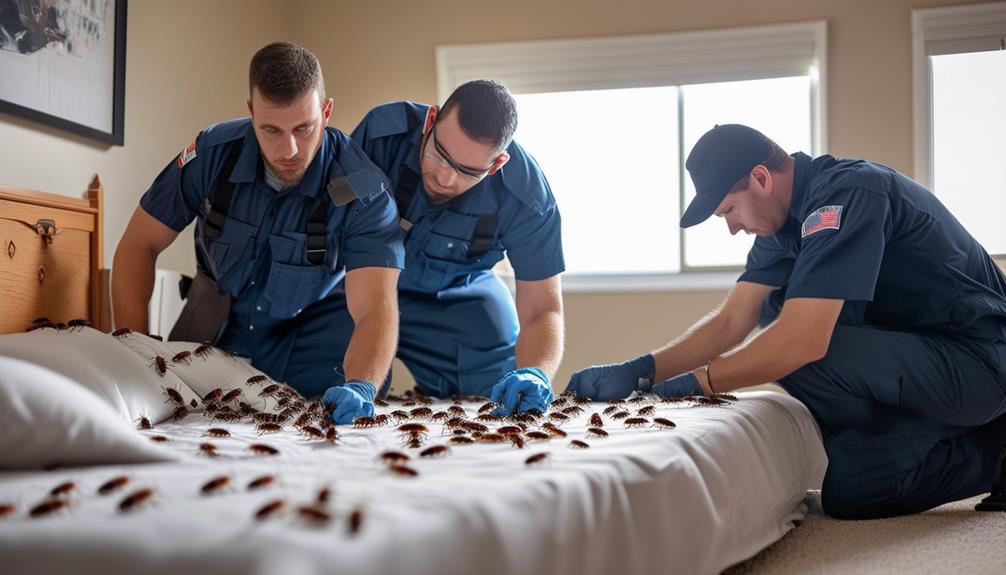You might think eating bananas attracts mosquitoes, but that’s a myth. Bug zappers aren’t very effective against mosquitoes either. Citronella candles offer limited protection. Ultrasonic repellent devices are unproven. Mosquitoes can still bite through clothing, so long sleeves aren’t foolproof. Discover the truth about common misconceptions to better control these pests.
Key Takeaways
- Eating bananas does not attract mosquitoes, contrary to popular belief.
- Bug zappers are not very effective in reducing mosquito populations.
- Citronella candles provide limited protection against mosquitoes.
- Ultrasonic mosquito repellent devices have not been proven to work.
- Mosquitoes can still bite through clothing, so wearing long sleeves is not foolproof.
Mosquitoes Prefer Certain Blood Types
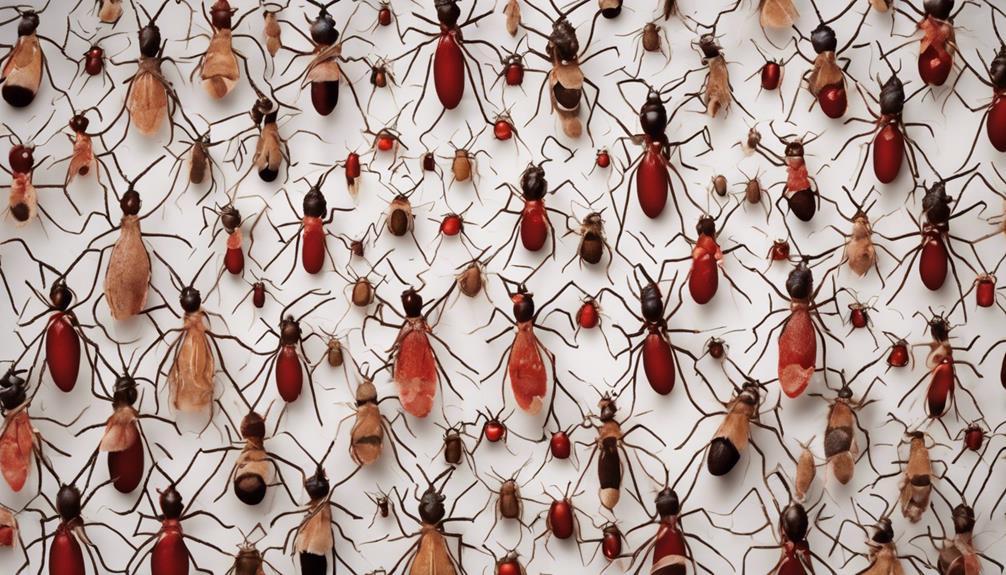
When it comes to mosquito preferences, Aedes aegypti mosquitoes exhibit a distinct liking for individuals with type-B blood. Research suggests that different blood types may influence mosquito biting preferences. Factors such as body odor, body heat, lactic acid, and carbon dioxide also play a role in mosquito attractiveness. Studies indicate that mosquitoes have preferences in choosing their targets based on various factors, with blood type being one of them.
Mosquitoes have evolved to be attracted to certain blood types, like type-B, more than others. This preference is thought to be related to the different chemical compounds present in the blood that mosquitoes can sense. Individuals with type-B blood might be more prone to mosquito bites due to these chemical cues. Understanding this aspect of mosquito behavior can aid in the development of targeted mosquito control strategies that take into account the varied preferences of these insects.
Standing Water Attracts Mosquitoes
Standing water acts as a magnet for mosquitoes due to its role as a breeding ground for their larvae. Mosquitoes are naturally drawn to areas with stagnant water to lay their eggs, exploring their reproductive cycle. This phenomenon highlights the importance of eliminating sources of standing water around your living spaces to curb mosquito populations effectively. Even small containers like bottle caps can harbor enough water for mosquitoes to breed, emphasizing the need for meticulous mosquito control measures.
To better understand the impact of standing water on mosquito activity, let’s explore into a comparison table:
| Container | Status of Water | Likelihood of Mosquito Attraction | Recommendation |
|---|---|---|---|
| Birdbath | Stagnant | High | Regular cleaning |
| Gutter | Clogged | Very High | Periodic maintenance |
| Flower Pot Saucer | Filled | Medium | Empty excess water |
| Unused Tires | Collected | Extreme | Proper disposal |
Mosquito Activity Linked to Weather
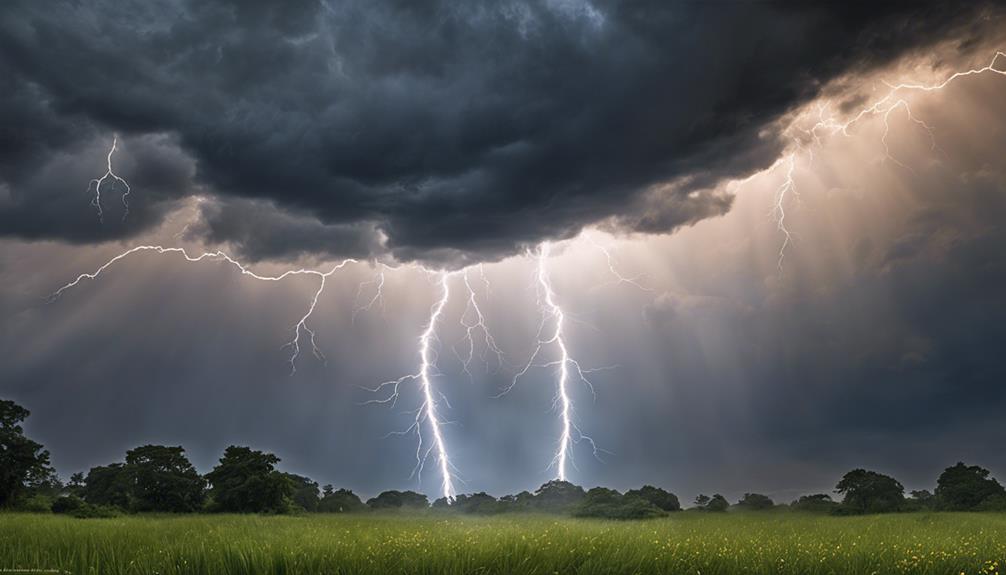
You may be surprised to learn how weather impacts mosquito activity.
Warm and humid conditions are like a welcome sign for mosquitoes, leading to increased activity.
Understanding seasonal patterns and temperature fluctuations can help predict mosquito presence and take necessary control measures.
Weather Impact on Mosquitoes
Weather conditions play a significant role in influencing the activity levels and population dynamics of mosquitoes. Factors such as temperature, humidity, and rainfall affect mosquito development and the availability of breeding sites. Warmer temperatures can accelerate the growth of mosquitoes, leading to increased activity.
Heavy rain creates more stagnant water areas, ideal breeding sites for mosquitoes, resulting in a rise in their population. The humid environment provides an ideal setting for mosquitoes to thrive and reproduce. Different weather patterns across regions can alter the distribution and abundance of mosquito species.
Understanding how weather impacts mosquitoes is vital in implementing effective control measures to manage their populations and reduce the risk of vector-borne diseases.
Seasonal Mosquito Patterns
Seasonal changes in weather patterns greatly influence the activity levels and breeding behaviors of mosquitoes. Mosquitoes thrive in warmer weather, with increased breeding and activity during the summer months.
Rainfall plays an essential role by creating ideal breeding conditions through the accumulation of standing water. These seasonal patterns lead to fluctuations in mosquito populations throughout the year, with peaks during the warmer months.
Understanding these trends can help in implementing effective mosquito control measures to reduce their impact on human populations. By being aware of how weather influences mosquito behavior, you can take proactive steps to minimize their presence, especially during times when conditions are most favorable for their breeding and activity.
Temperature and Mosquitoes
Temperature fluctuations play a significant role in influencing the activity levels and breeding behaviors of mosquitoes. When it comes to mosquito activity and control strategies, understanding how temperature impacts these aspects is essential.
- Mosquitoes thrive in warmer temperatures, leading to increased activity levels.
- Humid and hot environments are preferred by mosquitoes, making them more active in such conditions.
- **Temperature fluctuations influence mosquito breeding and feeding patterns, affecting their population growth.
- **Effective control strategies must take into consideration the relationship between temperature and mosquito behavior to target interventions accurately.
Myths Surrounding Mosquito Feeding Habits
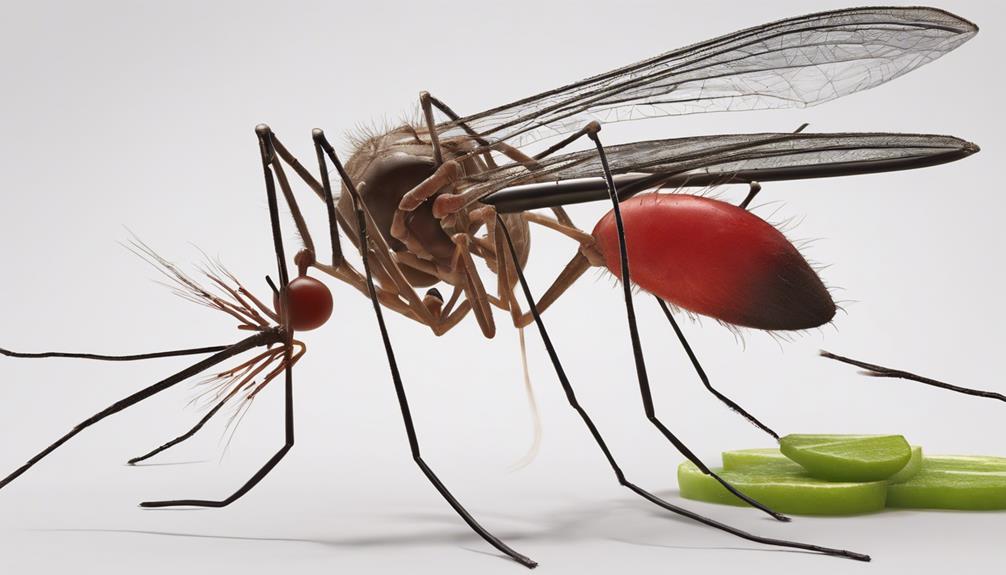
Female mosquitoes have a preference for feeding on humans as they require blood for egg production.
Contrary to popular belief, mosquitoes are most active during the dawn and dusk periods, seeking hosts for their blood meals.
Additionally, mosquitoes are selective in their feeding habits, with some species showing a preference for certain hosts over others.
Mosquitoes Prefer Humans
An important aspect to understand about mosquito feeding habits is their preference for humans as blood meal sources to facilitate egg development. When it comes to why mosquitoes prefer humans, factors such as body odor, body heat, and carbon dioxide levels play a critical role. Additionally, specific elements like blood type and lactic acid levels can influence a mosquito’s biting preference.
It’s essential to note that only female mosquitoes require a blood meal for egg development, as male mosquitoes solely feed on nectar. Surprisingly, certain mosquito species, such as the Elephant Mosquito, target other mosquitoes, particularly focusing on disease-spreading mosquito larvae. Understanding these preferences can help in developing effective mosquito control strategies.
Mosquitoes Feed at Dawn
Mosquito feeding behavior, particularly the belief that they exclusively feed at dawn, is a common misconception that requires clarification based on various influencing factors. While mosquitoes are known to be active at dawn, they can also feed at other times of the day. Their feeding habits are influenced by factors such as light, temperature, and host availability.
Dawn feeding patterns may vary among mosquito species and are affected by environmental conditions, moon phases, and weather patterns. Understanding these nuances in mosquito feeding habits is important for implementing effective control strategies. By recognizing that mosquitoes aren’t limited to feeding only at dawn, control measures can be tailored to target their activity during various times of the day, leading to more successful mosquito control outcomes.
Mosquitoes Are Selective
When it comes to mosquito feeding habits, understanding their selectivity is key to effective control strategies. Here are some important facts about mosquito selective feeding habits and preferences:
- Aedes aegypti mosquitoes show a preference for individuals with type-B blood, influencing their feeding habits.
- Female mosquitoes feed on blood for egg development, while male mosquitoes primarily consume nectar.
- Certain mosquito species, like Elephant Mosquitoes, exhibit selective feeding behaviors by preying on other mosquitoes.
- Elephant Mosquito larvae play a significant role in mosquito control by consuming larvae of disease-spreading mosquitoes, showcasing their unique feeding habits.
Understanding these selective feeding habits is essential for developing successful mosquito control strategies.
Common Misconceptions About Mosquito Behavior
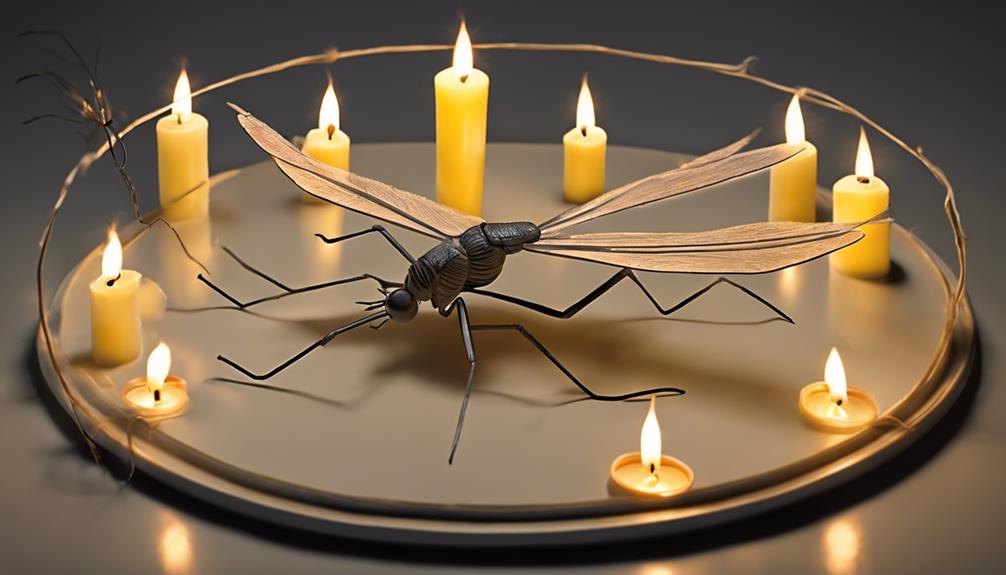
Contrary to popular belief, mosquitoes do not solely rely on visual cues to locate their hosts for feeding. Mosquitoes are actually attracted to specific biochemical factors such as carbon dioxide, lactic acid, and body heat. Factors like blood type, body odor, and temperature also play a key role in influencing mosquito attraction. Additionally, wearing dark colors can increase mosquito attraction, while lighter colors like yellow are less appealing to them. Another interesting fact is that mosquitoes require sugar for survival, with both male and female mosquitoes feeding on nectar. Furthermore, mosquitoes are more active during a full moon, utilizing moonlight to find hosts for feeding.
| Mosquito Behavior Misconceptions | Facts |
|---|---|
| Mosquitoes rely on visual cues | Attracted to biochemical factors |
| Dark colors repel mosquitoes | Dark colors increase attraction |
| Only females feed on blood | Both genders feed on nectar for survival |
| Mosquitoes feed during the day | More active during a full moon |
| Mosquitoes only target humans | Attracted to various hosts for feeding |
The Truth About Mosquito Bite Triggers
Amidst the intricate web of factors that influence mosquito biting behavior, understanding the triggers that attract these pests is essential for effective control measures. When it comes to mosquito attraction triggers, here are some key points to keep in mind:
- Mosquitoes are attracted to carbon dioxide, lactic acid, and body heat, which are all factors that can lead them to bite.
- Factors like blood type, body odor, and wearing dark clothing can also play a role in attracting mosquitoes to individuals.
- Contrary to popular belief, foods like bananas or avocados don’t directly attract mosquitoes, as their main triggers are related to human body chemistry.
- Mosquitoes are more drawn to individuals who emit higher levels of carbon dioxide and lactic acid, making some people more prone to mosquito bites.
Understanding these mosquito attraction triggers is vital in developing effective mosquito control strategies that target the root causes of their attraction to humans.
Misunderstandings About Mosquito Repellents
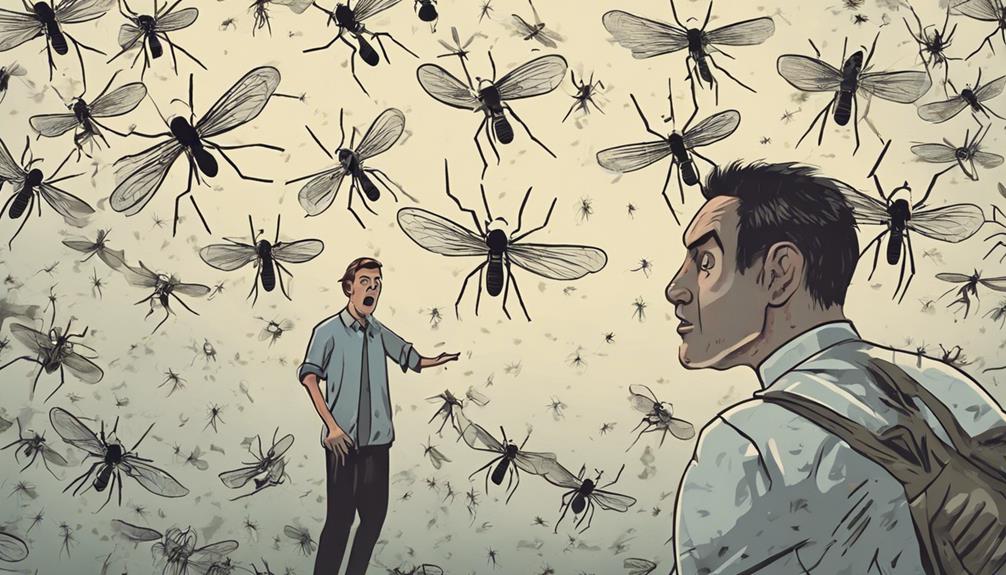
To fully grasp effective mosquito control strategies, it’s important to address common misunderstandings surrounding mosquito repellents. When choosing an insect repellent, it’s imperative to understand the various options available to protect yourself effectively. Here are some key facts about popular mosquito repellents:
| Insect Repellent | Key Information |
|---|---|
| DEET | Most effective ingredient recommended by experts for repelling mosquitoes. |
| Picaridin | A suitable alternative to DEET for individuals with sensitivities. |
| Oil of Lemon Eucalyptus | Natural repellent providing protection against mosquitoes. |
| IR3535 | Synthetic repellent effective against various insects, including mosquitoes. |
| Permethrin-treated Clothing | Offers long-lasting protection against mosquito bites when worn. |
Understanding the differences between these repellents can help you make an informed decision when selecting the most appropriate protection. Remember, DEET is highly effective, but alternatives like Picaridin and natural options such as Oil of Lemon Eucalyptus can also provide reliable defense against mosquitoes. Additionally, consider using Permethrin-treated clothing for extended protection in heavily infested areas.
Debunking Mosquito Reproduction Myths
Female mosquitoes are the primary ones that require a blood meal for egg development. Understanding mosquito reproduction can help in effectively controlling their populations. Here are some essential facts to debunk common myths:
- Female Mosquitoes Only: Only female mosquitoes feed on blood as they need the protein for egg development. Male mosquitoes don’t partake in reproduction and mainly feed on nectar.
- Diverse Diets: Some mosquito species, like Elephant Mosquitoes, have unique feeding habits, preying on other mosquito larvae rather than blood.
- Standing Water: Removing sources of standing water is crucial for controlling mosquito breeding. Stagnant water serves as a breeding ground for mosquitoes.
- Control Strategies: Implementing thorough mosquito control strategies is important for managing mosquito populations effectively. This includes measures like eliminating standing water, using larvicides, and employing traps to reduce adult mosquito numbers.
Facts Vs. Fiction: Mosquito Disease Transmission
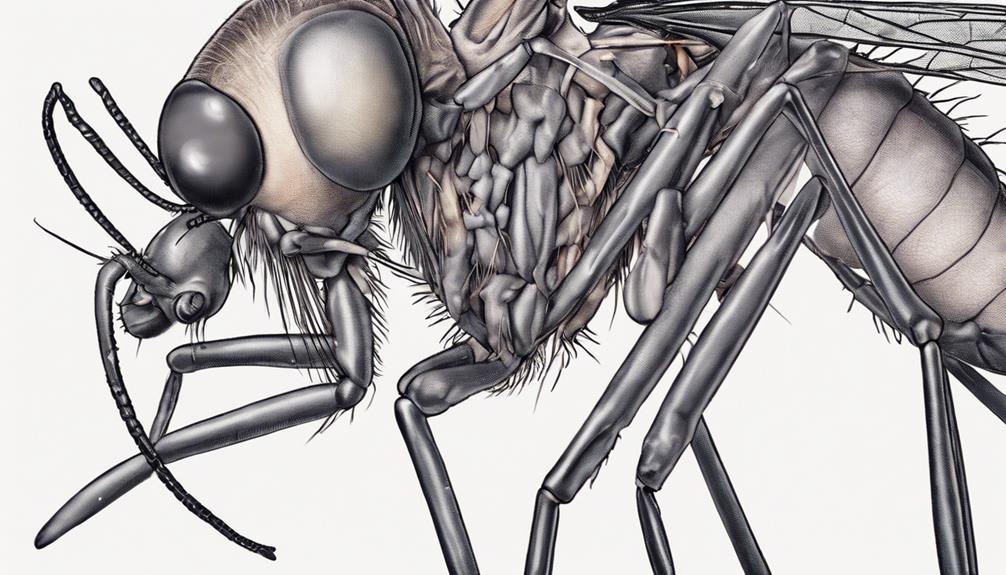
In understanding mosquito disease transmission, it’s important to recognize the role these insects play in spreading illnesses like malaria, dengue fever, Zika virus, and West Nile virus to humans through their bites.
Mosquitoes are drawn to humans and other animals by the carbon dioxide we exhale, body heat, and certain odors, making it essential to reduce the number of these insects to lower the chances of being bitten and contracting diseases.
When mosquitoes feed on blood, they can carry and transmit pathogens that cause diseases, posing a significant public health concern globally due to the potential for widespread outbreaks.
The saliva injected by mosquitoes during a bite can contain disease-causing pathogens, leading to infections in humans.
Effective mosquito control measures, such as eliminating standing water where mosquitoes breed and using insect repellents, are necessary for reducing the transmission of diseases like malaria and dengue fever.
Effective Mosquito Control Strategies
To effectively control mosquitoes, consider using repellents containing at least 15% DEET and be mindful of environmental factors like climate and shade that attract mosquitoes.
TruGreen Mosquito Defense solutions have been shown to be successful in reducing mosquito activity.
Additionally, adjusting your diet to avoid foods that increase lactic acid levels and wearing light-colored clothing can help minimize mosquito attraction.
Preventive Measures for Mosquitoes
Implementing effective preventive measures is crucial in controlling mosquito populations and reducing the risk of mosquito-borne diseases. To effectively combat mosquitoes, follow these preventive measures:
- Eliminate standing water: Remove any containers that can collect water, like buckets or tires, to prevent mosquito breeding grounds.
- Use mosquito repellents: Opt for repellents containing at least 15% DEET to protect yourself from mosquito bites.
- Consider environmental factors: Be mindful of factors like climate and shade that attract mosquitoes to certain areas.
- Implement TruGreen Mosquito Defense: Utilize professional solutions to control mosquito activity effectively and efficiently.
Natural Repellent Options
Consider incorporating natural repellent options into your mosquito control strategy to effectively deter these pesky insects. Essential oils such as citronella, lavender, and eucalyptus have been found to act as natural mosquito repellents.
Planting mosquito-repelling herbs like basil, mint, and rosemary in your garden can also help in keeping mosquitoes at bay. Additionally, using garlic or neem oil sprays has shown effectiveness in naturally repelling mosquitoes.
Another eco-friendly approach is installing bat houses to attract bats, which are natural predators of mosquitoes, aiding in effective mosquito control. Furthermore, incorporating mosquito-repelling plants like marigolds, catnip, and lemongrass can provide a natural barrier against these bothersome insects.
Frequently Asked Questions
Does Garlic Really Repel Mosquitoes?
Garlic’s effectiveness as a mosquito repellent is limited. While it may have some natural repellent properties, it is not a reliable solution. Don’t solely rely on folk remedies like garlic; consider proven methods for effective mosquito control.
Does Eating Less Sugar Keep Mosquitoes Away?
Eating less sugar won’t keep mosquitoes away. Mosquitoes are more attracted to carbon dioxide, lactic acid, and body heat than sugar levels. To deter them, try lemon-scented candles, essential oils, or citronella plants.
Does Vitamin B12 Prevent Mosquito Bites?
Vitamin B12 does not prevent mosquito bites. Factors like carbon dioxide levels, body odor, and heat influence mosquito attraction. Consider using citronella candles, lemon eucalyptus, or DEET spray for effective mosquito control, as they are more proven methods.
What Is a Bad Fact About Mosquito?
You are a magnet to mosquitoes, drawing them in with your breath, sweat, and warmth. Their breeding habits and the potential for disease transmission make it important to understand their behavior and take preventive measures.




